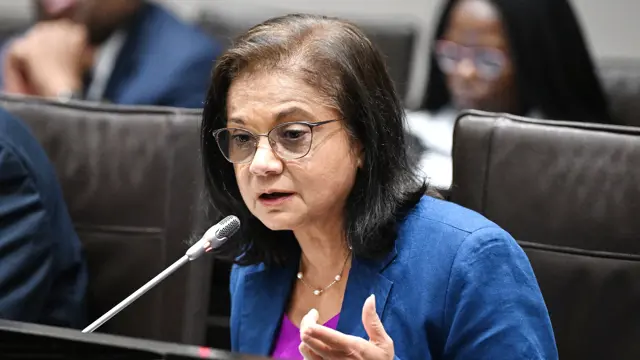June 21, 2025 – National Director of Public Prosecutions (NDPP) Shamila Batohi remains resolute in the face of mounting calls for her resignation. Despite opposition parties and activist groups increasing pressure on her to step down, Batohi says she will only leave office if she believes she is failing in her duties — and insists that moment hasn’t come.
Speaking to EWN on the sidelines of Parliament this week, Batohi defended her tenure, arguing that criticism of the National Prosecuting Authority (NPA) is often focused on high-profile case setbacks, while overlooking the institution’s substantial performance improvements in recent years.
“The NPA is being unfairly judged on a few headline losses,” said Batohi, “but we’ve made significant progress that deserves recognition. There’s incredibly good work happening that never makes the front pages.”
Batohi was responding to protests by ActionSA, which held a public demonstration outside the Department of Justice on Thursday. The party demanded that the Minister of Justice initiate the formal process for her removal, citing the NPA’s failure to secure convictions in some major state capture-related cases.
In response, Batohi remained unshaken:
“I’m not in this job for power or money. I took this role to serve the people of South Africa and to uphold justice. That mission continues.”
Batohi Highlights NPA’s Institutional Progress
Since her appointment in 2019, Batohi has overseen a challenging but transformative period for the NPA. She emphasized that while some complex prosecutions have faced obstacles, the broader progress — especially in restructuring, capacity building, and legal compliance — cannot be ignored.
One of Batohi’s key achievements includes leading the NPA through reforms to meet the Financial Action Task Force (FATF) requirements. These reforms played a critical role in South Africa’s efforts to get off the FATF’s “greylist” for inadequate financial crime enforcement.
“We’ve tackled two of the hardest requirements on that list,” she explained. “This is proof of the NPA’s capability when we’re supported and given the tools we need.”
She also noted that efforts to rebuild the institution, following years of internal damage and compromised leadership, are beginning to bear fruit.
“When I came in, the NPA was hollowed out. We’ve had to rebuild from the inside, attract experienced prosecutors, and reestablish our credibility. That takes time — and courage.”
Despite her stance, opposition parties continue to criticize Batohi’s leadership, accusing her of failing to deliver results in corruption-related cases and mismanaging prosecutorial priorities. Some lawmakers have pointed to the collapse of charges in several politically sensitive trials as justification for her removal.
Earlier this week, Batohi also had to clarify remarks she made in a previous parliamentary session, where she used the term “infiltrated” to describe past interference in the NPA. She admitted using the wrong terminology, but stood by the broader point that the institution had been deeply compromised under previous leadership.
“I take responsibility for my wording,” she said, “but we cannot ignore the reality that the NPA was severely weakened. The clean-up is ongoing, and it is not easy.”
With only seven months left in her term, Batohi has made it clear that she intends to serve until the end — and on her own terms. She said resigning now would only distract from the NPA’s mission at a time when stability and continuity are essential.
“There’s still work to be done, and I plan to finish it. Leadership isn’t about running away when things get tough — it’s about seeing the job through.”
Her determination has received backing from some civil society groups and legal professionals who argue that reforming a broken institution like the NPA is a long-term task that cannot be measured solely by immediate court victories.
“We need consistency and integrity,” said legal analyst Rebone Mokoena. “Batohi inherited an agency in crisis. While the pace of prosecutions may be slow, the institutional recovery is real.”
As her final months in office unfold, the focus will likely remain on Batohi’s handling of politically sensitive prosecutions and the NPA’s ability to demonstrate tangible results. Whether or not the pressure intensifies, Batohi seems committed to completing her mission with resilience and principle.
“I welcome accountability,” she said. “But my conscience is clear. I will step aside only if I believe I’m no longer fit to lead. That is not the case today.”
Source- EWN

